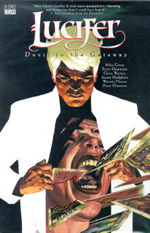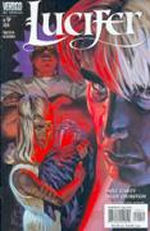
 Writer: Mike Carey
Writer: Mike Carey
Artists: Scott Hampton, Chris Weston, James Hodgkins, Warren Pleece
and Dean Ormston
Colourist: Daniel Vozzo
Letterers: Todd Klein, Ellie De Ville
Collecting issues #1-3 of the LUCIFER mini-series and #1-4 of the ongoing series.
Price: $13.95
Publisher: DC Vertigo
ISBN: 1-56389-733-4
When asked to describe Vertigo's LUCIFER series, I often say, "Well, it's about the Devil, who, as we know, is 'a man of wealth and taste.'" Or, to go for something really esoteric, I'm reminded of the time I watched a video montage of X-FILES villain Alex Kryeck set to music by the Cherry Popping Daddies. After it finished, the woman next to me commented, "Krycek may be a bastard, but damn, he has style."
The same could be said of Mike Carey's Lucifer. It's his ineffable sense of style that makes Lucifer so intriguing. One likes him for the same reasons one likes Alex Krycek or Ryan O'Reily (from the TV series OZ). He's not an anti-hero, just an unrepentant, unabashed class-A bastard.
While Vertigo can be accused of strip-mining the SANDMAN name and legacy, LUCIFER does not suffer from the same sort of mediocrity and blandness that has plagued most SANDMAN offshoots, and its origins should not be held against it. Carey is a writer of dynamic vision and savage wit who understands that the problem with most depictions of the devil is that he is neither interesting nor scary, and comes across as little more than a horned buffoon and bully.
'Carey's Lucifer is utterly chilling in his penetrating intellect and utter lack of compassion.' Carey's Lucifer is utterly chilling in his penetrating intellect, cold gaze, and utter lack of empathy or compassion. Like Milton's Satan, Carey's Lucifer has only one love: himself. The action in the stories contained in this trade collection flows from this fact. Lucifer cares not a wit about others and is always out to further his own ends. The protagonists damn themselves through their own weaknesses, through pursuit of their own selfish ends. Lucifer is not the architect of the suffering seen in these stories. Nobody goes to hell that does not put himself there. Lucifer does little more than capitalise upon their mistakes. (All right, he greases the skids here and there, but the protagonists can always choose not to smash that Champagne bottle.) Lucifer never lies to anyone... he just never tells the whole truth about his agenda.
The first part of this book collects the LUCIFER mini series, in which Lucifer's on a mission from God. Yes, that God. It seems that some ancient minor gods have found a source of 'prayer' that could make them not-so-minor, and God wants them stopped. Lucifer understands why they must be stopped before they upset the current power structure, and strikes a deal with God. This is bound up with the quest of a young woman to have her dead brother brought back to life. I won't give everything away, but suffice it to say that getting what one has wished for seldom brings happiness... and one has to admit a certain admiration for the way Lucifer manipulates events to ensure that his dreams came to fruition.
Scott Hampton's art is swell, it's Scott Hampton. Need I say more? The expressive qualities in his art make it clear why he has become one of the more prominent painters in comics. Not only is he a master of subtle facial expressions, but he also makes great use of colour to help establish mood.
 The second half of the collection reprints the first four issues of the ongoing series, which followed the success of the miniseries. This is not Carey's most dynamic writing, but the story is important because it introduces several key characters to the series (such as Jill Presto and Elaine Belloc) and establishes how Lucifer creates his gateway between worlds. It's largely the necessary set-up for the stunning 'House of Windowless Rooms' and subsequent story arcs. The subplots revolve round how Jill Presto attains the power of the Basanos (think Tarot cards with an attitude) and the suffering brought about by neo-Nazism and homophobia. Chris Weston provides the art, but while his work is normally very enjoyable, something about the art just seems 'off' in this story. I can't decide if its because his pencils look rushed and muddy (perhaps the result of heavy handed inking) or if it's because his style isn't necessarily the best choice for this kind of tale.
The second half of the collection reprints the first four issues of the ongoing series, which followed the success of the miniseries. This is not Carey's most dynamic writing, but the story is important because it introduces several key characters to the series (such as Jill Presto and Elaine Belloc) and establishes how Lucifer creates his gateway between worlds. It's largely the necessary set-up for the stunning 'House of Windowless Rooms' and subsequent story arcs. The subplots revolve round how Jill Presto attains the power of the Basanos (think Tarot cards with an attitude) and the suffering brought about by neo-Nazism and homophobia. Chris Weston provides the art, but while his work is normally very enjoyable, something about the art just seems 'off' in this story. I can't decide if its because his pencils look rushed and muddy (perhaps the result of heavy handed inking) or if it's because his style isn't necessarily the best choice for this kind of tale.
Really, this book should have been broken into two trades - the first miniseries and then a collection of the first two story arcs of the regular series. Granted, this would make for a rather thin first book, but the contrast between the art would be much less jarring, and readers new to LUCIFER could read the first story arc in the correct manner - as the lead in/set-up to the jaw-droppingly awesome 'House of Windowless Rooms.'
Though flawed in presentation, LUCIFER: DEVIL IN THE GATEWAY should serve to give new readers an ample taste of one of the most delicious titles to come out of Vertigo in a long time.

This article is Ideological Freeware. The author grants permission for its reproduction and redistribution by private individuals on condition that the author and source of the article are clearly shown, no charge is made, and the whole article is reproduced intact, including this notice.


